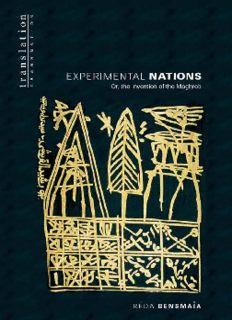
Experimental Nations: Or, the Invention of the Maghreb (Translation Transnation) PDF
Preview Experimental Nations: Or, the Invention of the Maghreb (Translation Transnation)
Experimental Nations T R A N S L A T I O N T R A N S N A T I O N S E R I E S E D I T O R E M I L Y A P T E R WritingOutsidetheNation BY AZADE SEYHAN TheLiteraryChannel:TheInter-NationalInventionoftheNovel EDITED BY MARGARET COHEN AND CAROLYN DEVER AmbassadorsofCulture:TheTransamericanOriginsofLatinoWriting BY KIRSTEN SILVA GRUESZ WhatIsWorldLiterature? BY DAVID DAMROSCH ExperimentalNations:Or,theInventionoftheMaghreb BY RE´DA BENSMA¨IA RE´ DA BENSMA¨IA Experimental Nations Or, the Invention of the Maghreb TRANSLATED BY ALYSON WATERS PRINCETON UNIVERSITY PRESS PRINCETON AND OXFORD Copyright©2003byPrincetonUniversityPress PublishedbyPrincetonUniversityPress,41WilliamStreet, Princeton,NewJersey08540 IntheUnitedKingdom:PrincetonUniversityPress, 3MarketPlace,Woodstock,OxfordshireOX201SY AllRightsReserved LibraryofCongressCataloging-in-PublicationData Bensma¨ıa,Re´da [Nationsexpe´rimentales.English] Experimentalnations:or,theinventionoftheMaghreb/Re´daBensma¨ıa;translatedbyAlyson Waters. p.cm.—(Translation/transnation) Includesbibliographicalreferenceandindex. ISBN:0-691-08936-1(alk.paper)—ISBN:0-691-08937-X(pbk.:alk.paper) 1.NorthAfricanliterature(French)—Historyandcriticism.I.Waters,Alyson,1955– II.Title.III.Series. PQ3988.5.N6B466132003 840.9′961—dc21 2002074906 BritishLibraryCataloging-in-PublicationDataisavailable. ThisbookhasbeencomposedinMinionwithGillSansdisplay. Printedonacid-freepaper.∞ www.pupress.princeton.edu PrintedintheUnitedStatesofAmerica 10 9 8 7 6 5 4 3 2 1 CONTENTS TRANSLATOR’S NOTE vii ACKNOWLEDGMENTS ix INTRODUCTION Isan“Experimental”NationPossible? 1 1 NationsofWriters 11 1. Cultural“Terrain” 11 2. ANewGeolinguistics 14 2 CitiesofWriters 27 1. TheImaginaryoftheMedinainFrancophoneLiterature fromtheMaghreb 27 2. Algiers/Paris,ortheCityasa“SiteofMemory”: MerzakAllouache’sSalutCousin 38 3 NabileFare`s,orHowtoBecome“Minoritarian” 47 4 PostcolonialNations:PoliticalorPoeticAllegories? (OnTaharDjaout’sL’inventiondude´sert) 67 5 (Hi)storiesofExpatriation:VirtualCountries 83 1. AssiaDjebar’sLaNoubadesfemmesduMontChenoua: IntroductiontotheCinematicFragment 83 v 6 MultilingualismandNational“Traits” 99 1. “TranslatingorWhitingOutLanguage”:On Khatibi’sAmourBilingue 99 2. OnKhatibi’sNotionofthe“ProfessionalTraveler” 124 3. WritingMetafiction:OnKhatibi’sLelivredusang 135 7 TheCartographyoftheNation:MouloudFeraoun’s LefilsdupauvreRevisited 149 8 ByWayofaConclusion 159 APPENDIX LeDe´pays:OnChrisMarker’sLettredeSibe´rie(1957) 165 NOTES 171 INDEX NOMINUM 205 INDEX REUM 209 vi CONTENTS TRANSLATOR’SNOTE Where a published English version of authors cited was available, I haveuseditthroughout,andmadereferencetoitaccordingly.Allother translationsofcitationsaremyown.Chapter5,section1,andchapter 6, section 3, of this book were translated by Jennifer Curtiss Gage. I would like to thank Re´daBensma¨ıa for his generous and pa- tientresponsestomyqueriesoverthecourseofthistranslation.Iwould alsoliketothankGwenae¨lKerlidouandRogerCelestinforlendingme, on occasion, their g´enie de la (bi) langue. vii This page intentionally left blank ACKNOWLEDGMENTS Thisbookiscomposedoftextsthatcovermorethantenyearsofwork onFrancophoneliteraturefromtheMaghreb.Itwouldneverhaveseen thelightofdayhaditnotbeenforEmilyApter’spersistentandpersis- tently friendly offer to include one of my books in the series she edits for Princeton University Press. I owe to her my awareness that these texts, which had each taken shape in specific historical circumstances, together sketched out the map of a “country” that I did not yet know and would only discover at the end of my journey. As I was piecing together the different sections of this map, the experimental nature of the works under study here began to emerge as the discovery of a sui generisvirtualreality,thatis,ofanunknownMaghrebthatborewithin it a mad, intense hope. And now, at the moment this book is being published, I cannot forget that Algeria is filled with a violence that divides it internally, and separates it from the other countries of the Maghreb as well. This is yet one more reason not to be discouraged and to continue, resolutely, to survey the territory. There is the map that this book represents—a map that is no doubt partial in both senses of the word: incomplete and biased. But there are also the sections of this map I mentioned above, and whose contours I could not have begun to trace without the help of those explorers who have accompanied me since the start of my work. Only after the fact did I realize how impossible it would have been to travel across such uneven terrain had I not encountered these inspiring pio- neers: Franc¸oise Lionnet, Ronnie Scharfman, Danielle Marx-Scouras, ix
Description: